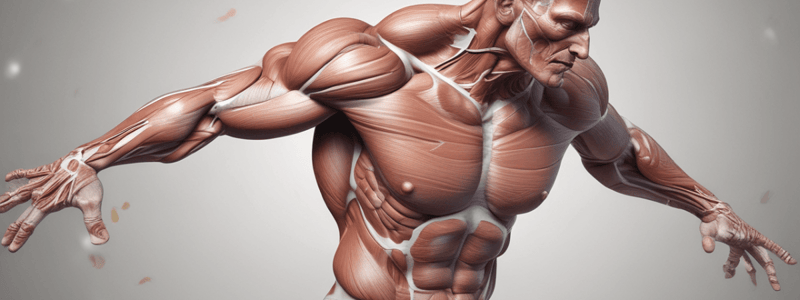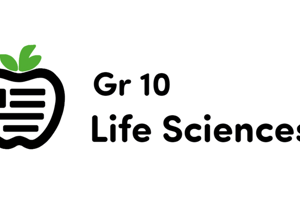Podcast
Questions and Answers
What is the largest muscle in the human body?
What is the largest muscle in the human body?
Which muscle is considered the strongest in the body?
Which muscle is considered the strongest in the body?
What is the main function of muscles related to energy metabolism?
What is the main function of muscles related to energy metabolism?
In terms of body mass, who typically has more skeletal muscle?
In terms of body mass, who typically has more skeletal muscle?
Signup and view all the answers
Apart from movement, what other function do muscles perform?
Apart from movement, what other function do muscles perform?
Signup and view all the answers
What is one of the key learning outcomes related to muscle fibers in the text?
What is one of the key learning outcomes related to muscle fibers in the text?
Signup and view all the answers
What is the main responsibility of cardiac muscles?
What is the main responsibility of cardiac muscles?
Signup and view all the answers
Which term refers to the muscle's ability to respond to stimulation?
Which term refers to the muscle's ability to respond to stimulation?
Signup and view all the answers
What is the function of smooth muscles?
What is the function of smooth muscles?
Signup and view all the answers
Which component is characteristic of skeletal muscle cells?
Which component is characteristic of skeletal muscle cells?
Signup and view all the answers
What does the term 'sarcopenia' refer to?
What does the term 'sarcopenia' refer to?
Signup and view all the answers
What provides the striations on muscle cells in a longitudinal direction?
What provides the striations on muscle cells in a longitudinal direction?
Signup and view all the answers
What is the main difference between phasic and tonic contractions?
What is the main difference between phasic and tonic contractions?
Signup and view all the answers
Which of the following is NOT a location where smooth muscle contractions are found?
Which of the following is NOT a location where smooth muscle contractions are found?
Signup and view all the answers
What is the role of calmodulin in smooth muscle contraction?
What is the role of calmodulin in smooth muscle contraction?
Signup and view all the answers
How does the Ca2+ concentration affect smooth muscle contraction?
How does the Ca2+ concentration affect smooth muscle contraction?
Signup and view all the answers
What is one reason for smooth muscle contraction being 100-1000 times slower than skeletal muscle contraction?
What is one reason for smooth muscle contraction being 100-1000 times slower than skeletal muscle contraction?
Signup and view all the answers
What are some stimuli for smooth muscle contraction mentioned in the text?
What are some stimuli for smooth muscle contraction mentioned in the text?
Signup and view all the answers
What is the role of tropomyosin in muscle contraction?
What is the role of tropomyosin in muscle contraction?
Signup and view all the answers
What happens when ATP is dephosphorylated to ADP+Pi in muscle contraction?
What happens when ATP is dephosphorylated to ADP+Pi in muscle contraction?
Signup and view all the answers
What triggers the release of calcium from the Sarcoplasmic reticulum in muscle contraction?
What triggers the release of calcium from the Sarcoplasmic reticulum in muscle contraction?
Signup and view all the answers
Which factor determines how quickly muscle cells contract?
Which factor determines how quickly muscle cells contract?
Signup and view all the answers
What is the last step in muscle contraction where myosin moves along the actin filament?
What is the last step in muscle contraction where myosin moves along the actin filament?
Signup and view all the answers
What happens when a muscle cell is stimulated while a previous twitch is still occurring?
What happens when a muscle cell is stimulated while a previous twitch is still occurring?
Signup and view all the answers
What is a key characteristic of fast twitch muscle fibers?
What is a key characteristic of fast twitch muscle fibers?
Signup and view all the answers
What is a characteristic of slow twitch muscle fibers?
What is a characteristic of slow twitch muscle fibers?
Signup and view all the answers
What is the function of troponin in muscle contraction?
What is the function of troponin in muscle contraction?
Signup and view all the answers
What is the main difference between skeletal and smooth muscle in terms of contraction regulation?
What is the main difference between skeletal and smooth muscle in terms of contraction regulation?
Signup and view all the answers
What role does the motor nerve play in inducing tetanic contractions?
What role does the motor nerve play in inducing tetanic contractions?
Signup and view all the answers
Study Notes
Muscle Properties and Functions
- Muscle mass declines rapidly with age, leading to sarcopenia and reduced physical capacity
- Muscle functions include movement, thermoregulation, energy metabolism, and appetite regulation
- Muscles are composed of 18% protein and 75% water
Types of Muscles
- Skeletal muscles: attached to the skeleton, responsible for movement, voluntary movements
- Cardiac muscles (myocardium): forms the heart, responsible for pumping blood, involuntary movement
- Smooth muscles: located in tissues, responsible for controlling diameter of structures and peristalsis, involuntary movement
Muscle Structure
- Skeletal muscle cells:
- Multiple peripheral nuclei
- Blood vessels run between fibers
- Transverse section: parallel cells with connective tissue between to form fascicles
- Cytoplasmic striations
- Muscle fiber structure:
- Actin (thin myofilament): 6nm diameter, 1μm long
- Myosin (thick myofilament): 15nm diameter, 1.5μm long
- Sarcomere made up of actin and myosin filaments, provides striations on muscle cells in longitudinal direction
Muscle Contraction
- Muscle contraction requires ATP and calcium
- Steps of muscle contraction:
- ATP bound myosin is in the relaxed position
- ATP is dephosphorylated to ADP+Pi, positioning myosin to form a cross-bridge
- Electrical excitation releases calcium from the sarcoplasmic reticulum, allowing cross-bridge formation
- Power stroke: release of phosphate bound to myosin head, moving myosin head along the actin filament
- Muscle tension:
- Summation: a muscle cell is stimulated while a previous twitch is still occurring, resulting in a stronger twitch
- Tetanic contraction: a sustained muscle contraction evoked by a motor nerve emitting action potentials at a very high rate
Skeletal Muscle Fiber Types
- Fast twitch fibers:
- Possess smaller neuro-muscular junctions (NMJs)
- Facilitate efficiency and speed of neurotransmission
- Slow twitch fibers:
- Possess NMJs with larger surface area
- Facilitate sustained stimulation
Smooth Muscle Contraction
- Calcium influx into the cell from the sarcoplasmic reticulum and extracellular sources via L-type calcium channels
- Calcium binds to calmodulin in the sarcoplasm, activating MLCK, which phosphorylates the head of the myosin filament, leading to cross-bridge formation
- NO influx leads to relaxation
- Calcium concentration determines the force of contraction
- Smooth muscle contraction is 100-1000 times slower than skeletal muscle contraction, allowing for prolonged tonic contraction while consuming little ATP and O2
Studying That Suits You
Use AI to generate personalized quizzes and flashcards to suit your learning preferences.
Related Documents
Description
Test your knowledge on muscle structure, movement, and contraction with this quiz. Learn about different types of muscles, their functions, and interesting facts such as the strongest and smallest muscles in the human body.




